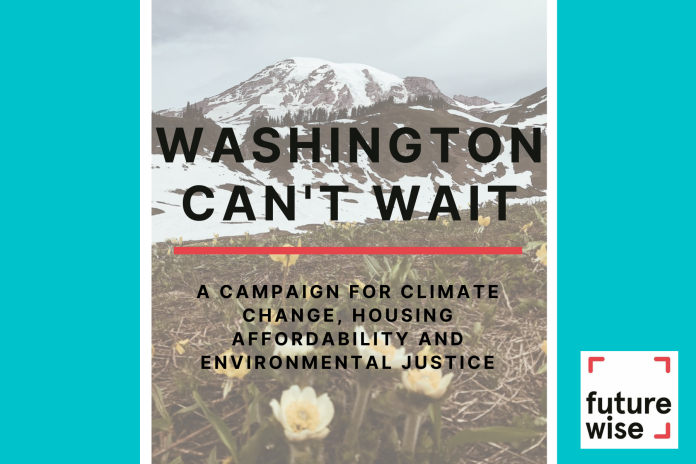Futurewise’s Campaign to Update the Growth Management Act
For thirty years, Futurewise has lobbied and litigated throughout Washington to implement the state’s Growth Management Act (GMA). Now, under a new initiative called Washington Can’t Wait, the organization is focused on making substantial changes to the law, responding to the moment that we are in and preparing for a very different future.
The organization is focusing on three amendments to the GMA that sets the requirements for what jurisdictions include in their plans. First, cities and counties must add a climate element to their plans, reducing greenhouse gas emissions and vehicle miles traveled. Second, a housing component will strengthen the requirements to plan for adequate and affordable housing, with policies to implement the plans. Third, an environmental justice component will include equitable outreach and policies that identify health and pollution impacts on communities.
These three components tie together by opening planning and soliciting solutions from people who are most directly impacted by gentrification, displacement, pollution, and structural racism. But the components also tap into a vein of opposition. Those who benefit the most from exclusionary housing are also more likely to deny climate change and avert their eyes from problems with racial equity.
Campaign Kickoff
On September 24th, Futurewise kicked off the Washington Can’t Wait campaign. The online event featured speakers from the Washington State Legislature and breakout groups. The group’s executive director Alex Brennan and lobbying consultant Bryce Yadon opened the event with a welcome and introductory remarks about the scope of the Campaign. Representatives Davina Duerr (D-District 1) and Joe Fitzgibbon (D-District 34) laid out the larger equity arguments for amending the GMA.
Over the 30 years that Futurewise have been stewards of the GMA, they have identified places where the act fails. It does not say anything about climate change or social and racial equity in land use development. Where the law requires comprehensive plans to address affordable housing, enforcement is difficult.
Representative Fitzgibbon called out the housing issue. “Environmental issues are enforced on appeals. Housing elements have not. The Courts have not put teeth on it.” Considering housing together with equity and climate change, Futurewise’s proposed amendments will allow the legislature to “confront inequities caused by climate change and the inequities caused by the housing shortage at the same time.”
According to Jamie Ptacek, Futurewise’s lead organizer for the campaign, the event included over 100 people on the call and started a successful fundraising campaign. Now the organization is turning towards coalition building and outreach. Starting this week, Futurewise will be running regional organizing in four areas of the state. Details and links to those meetings are below.
The regional organizing and outreach will be just the first opportunity to get involved. “The theory behind grassroots organizing is to build power and effect change,” says Ptacek. There is a “strategic arc of the campaign. Each meeting will have some time to connect with each other to build community and let people articulate how they get involved. Then they communicate with legislators.”
Deadlines
While the Washington Can’t Wait campaign has the general deadline of the legislative calendar, there is a looming deadline of more significance. The laws passed this year set the basis for cities and counties to update their comprehensive plans in 2024. The next generation of comprehensive plans lock in development policies and patterns for the next decade.
There lies the power of the Growth Management Act. It is a machine to build other machines. The GMA is the pattern that prints out comprehensive plans for cities and counties in Washington. Policies required by the GMA–including highways, parking, and the urban growth boundary–can be seen written across the region. Policies that are not in the GMA are nowhere to be found. Affordable housing. Environmental justice. An adequate response to climate change.
So when Futurewise says that there are gaps in the GMA, it means that our communities are being laid out and developed with blindspots. When those gaps let industrial areas wither, scoop up farmland for development, or create private McMansion enclaves in the middle of the city, they are immense and dangerous blindspots. Changing them also elicits strong reaction.
According to Futurewise’s lobbyist Bryce Yadon, those top line goals establish their own opposition. “We’re looking at a dividing line between who believes in climate change and those who don’t. Then it is who wants to see equitable change. It is about changing the state of planning which has been historically dominated by white males. We’re fundamentally changing that.”
But this is also the year when Washington faces one of its toughest budgets, which highlights a different pattern of support and opposition. Amendments to the GMA may help local revenues by removing some of the impediments to building housing. This is a boon to larger jurisdictions, but difficult for smaller towns. As Yadon puts it, “They aren’t rolling in money. We don’t want to burden them with planning costs.” It is a balance that doesn’t fall strictly on ideological lines. It is a matter, like all things, of equity.
That’s why, three months before the legislative session, Futurewise is starting the conversation. According to Yadon, “If we do equitable outreach and environmental justice up front, it goes to understanding community needs.” Washington Can’t Wait is laying a groundwork of people and organizations for addressing these issues beyond just the legislative session.
This is the strategic arc that builds community, momentum, and lasting change. There will not only be a tailwind for legislation to put housing, environmental justice, and climate change into the GMA. There will be local momentum necessary to make sure the goals carry through every jurisdiction’s 2024 comprehensive plan updates.
Of course, behind the legislative calendar and the comprehensive plan calendars stalk the even broader threats to lives and communities in our region. It is, after all, 2020. Global CO2 concentration is above 400 ppm, millions of people took to the streets demanding racial justice, and one million people dead from a pandemic.
As Jamie Ptacek points out, there is a clarity to the overlapping existential threats. She sees, “a real political will to support the health and best interest of Washingtonians. The smoke shows us that climate change is already here.”
Representative Devina Duerr put it more directly: “If not this year when we’re stuck inside with a pandemic and wildfires, if not this year, when?”
This legislative session, Futurewise will try to show that Washington can’t wait for another year like 2020.
Ray Dubicki is a stay-at-home dad and parent-on-call for taking care of general school and neighborhood tasks around Ballard. This lets him see how urbanism works (or doesn’t) during the hours most people are locked in their office. He is an attorney and urbanist by training, with soup-to-nuts planning experience from code enforcement to university development to writing zoning ordinances. He enjoys using PowerPoint, but only because it’s no longer a weekly obligation.



